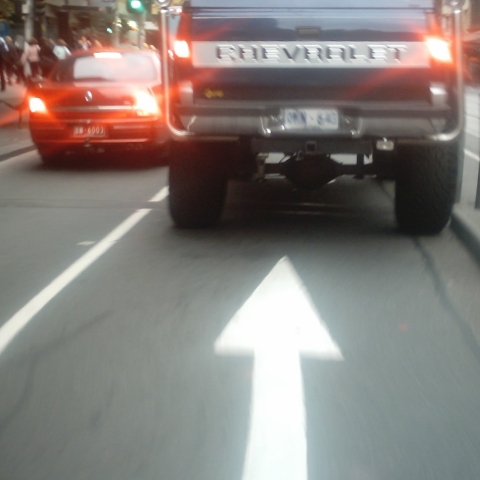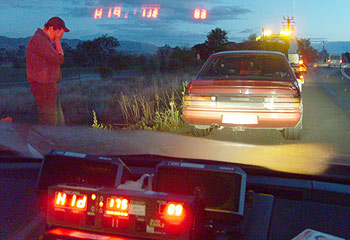I've just started reading Malcolm Gladwell's book The Tipping Point: How Little Things Can Make a Big Difference but it was merely by coincidence that his
New Yorker article from 2004,
Big and Bad: How the S.U.V. ran over automotive safety
, dropped into my lap this week. In it he
expands on the idea that
[small cars] are safe because they make their drivers feel unsafe. S.U.V.s are unsafe because they make their drivers feel safe. That feeling of safety isn't the solution; it's the problem.
It's worth reading the whole thing, but here are a few highlights:
…internal industry market research concluded that S.U.V.s tend to be bought by people who are insecure, vain, self-centered, and self-absorbed, who are frequently nervous about their marriages, and who lack confidence in their driving skills
I wonder if that reminds you of any SUV owners you know?
The truth, underneath all the rationalizations, seemed to be that S.U.V. buyers thought of big, heavy vehicles as safe: they found comfort in being surrounded by so much rubber and steel. To the engineers, of course, that didn't make any sense, either: if consumers really wanted something that was big and heavy and comforting, they ought to buy minivans, since minivans, with their unit-body construction, do much better in accidents than S.U.V.s.
But then, who ever thought that logic played a part in the decision to buy a SUV?

Size isn't everything, my friend.
Gladwell's comparison of piloting a Chevrolet TrailBlazer (an
enormous five-thousand-pound S.U.V.
) and a Porsche Boxster
convertible through a collision-avoidance obstacle course is
illuminating.
Most of us think that S.U.V.s are much safer than sports cars. If you asked the young parents of America whether they would rather strap their infant child in the back seat of the TrailBlazer or the passenger seat of the Boxster, they would choose the TrailBlazer. We feel that way because in the TrailBlazer our chances of surviving a collision with a hypothetical tractor-trailer in the other lane are greater than they are in the Porsche. What we forget, though, is that in the TrailBlazer you're also much more likely to hit the tractor-trailer because you can't get out of the way in time. In the parlance of the automobile world, the TrailBlazer is better at "passive safety." The Boxster is better when it comes to "active safety," which is every bit as important.
…The benefits of being nimble—of being in an automobile that's capable of staying out of trouble—are in many cases greater than the benefits of being big.
Don't fool yourself, you're a bloody idiot
If the inferior handling of SUVs is frightening, their inability to stop at speed is downright chilling:
…we did three emergency-stopping tests, taking the Chevrolet up to sixty m.p.h. [96 km/h] and then slamming on the brakes. It was not a pleasant exercise. Bringing five thousand pounds of rubber and steel to a sudden stop involves lots of lurching, screeching, and protesting. The first time, the TrailBlazer took 146.2 feet to come to a halt, the second time 151.6 feet, and the third time 153.4 feet. The Boxster can come to a complete stop from sixty m.p.h. in about 124 feet. That's a difference of about two car lengths, and it isn't hard to imagine any number of scenarios where two car lengths could mean the difference between life and death.
And speaking of speed, I noticed some good stuff from Spinopsys this week, connecting a couple of recent opinon pieces on speeding by Peter Martin and Martin O'Connor:
The issue that gets under my skin is the peculiar notion that has infested the motoring media in the past few years, notably led by Jeremy Clarkson of the TV program Top Gear, that to observe the speed limit is to drive unsafely. The gist of the argument is that in order to drive at the speed limit, you must not be able to look up from the dashboard. Personally, I think if you can't maintain a constant speed without constantly referring to your instruments, you're best off not being in charge of a motor vehicle, but this appears to be a minority view.
It requires peculiarly twisted logic to argue this way: going slower and having longer reaction times is going to be more dangerous? I've never been able to figure it out.
Marooning hooning loons a boon
Something else I've never been able to figure out is hoon driving, so
it's with some relish that I note that Victoria Police has impounded 2000 cars in the last 12 months under anti-hoon laws. The Sunday Herald Sun has some interesting stats about these human road hazards,
including the observation that they are not all young P-platers: One
in four hoons is aged more than 25.
But the best part of the Hun article is the shot of some dickhead blubbering like a baby after the borrowed car he was driving was impounded.
The 19-year-old man pictured weeping was arrested by Wodonga Traffic Management Unit officers for doing 175km/h on a narrow back road on April 30.
What a tool.
Assistant Commissioner (Traffic & Transport) Noel Ashby said the man was not the only hoon to be left in tears by the penalty.
"We see the big tough guy on the street reduced to tears pretty quickly," Mr Ashby said.
"We see people that were full of bravado completely shocked -- stunned as their car is pulled up on a flat-top (truck) and hauled off to an impoundment centre."
Pffftthahahahahaha! Oh, yesssss! There should be more of it.

Comments
Looks like a straw-man of Clarkson's position to me from the articles you've linked to. The point is not that going slower is safer - it obviously is. It's that the situation in the UK where cameras are more frequent and speed limits on some stretches of road have been lowered to well below the natural driving speed for that road, appears to be nothing more than cynical revenue raising (the A3 through my old stomping ground in SW London is a 3 lane divided freeway which was reduced from 70mph to 50mph with the addition of several cameras...). Too many cameras, set at near to zero-tolerance, at limits below what would normally be expected for that road, lead to far more attention being paid to the speedo and less to hazards. Clarkson, as well as decrying cameras, has also said that more traffic police should be on the roads actually doing policing, and with that view I cannot find fault.
The biggest issue in the UK, and I've noticed it here in Oz too, is that speed alone is treated as the major cause of accidents in road safety campaigns, when it's not.
The other day I saw the new TV advert showing the dangers of distracted drivers, and I cheered out loud. About time! It's almost always inattentive drivers that endanger us cyclists, not speeding ones - every incident I've had while riding in cities has been cars travelling at low speed either cutting me up or reversing into me, or idiots opening their door in my path...
I wish I could remember now who said it but the quote goes something like this - greatest addition to vehicle, pedestrian and cyclist safety is not a little sign on the steering wheel reassuring the driver that they're protected by an airbag, but the installation of a large metal spike pointing right up at the drivers head. It reinforces the idea that you are not safe and what you are doing is potentially very dangerous.
I agree entirely with Charlie that driver distraction is a serious problem, in fact I've had a bit of a rant on the topic just recently. The advert that he mentions is part of the "Distracted Drivers Are Dangerous" Campaign by Victoria's Traffic Accident Commission. My reaction was similar to Charlie's, although I'm also disappointed that we have to spend tax payer money to reinforce a message that's so blindingly obvious. Frankly, we shouldn't have to.
And the distraction thing is a large part of my concern about speed: the faster you go, the less reaction time you have. Then add on some of our modern in-car distractions and…well, I'm sure I don't have to draw a picture.
That said, I also take Charlie's point about slow-moving vehicles having their own peculiar dangers for cyclists. If I recall my high school physics correctly, conservation of momentum suggests that a dirty big car (an SUV, perhaps?) doesn't need to be travelling very fast to do a shirtload of damage to an unprotected cyclist or pedestrian.
On Clarkson, I happen to find him a likeable buffoon but it seems his message on speed cameras doesn't travel well to these shores. Assuming what Charlie says is correct—and I have no reason to doubt him—the installation and operation of speed cameras is far more draconian in the UK than here. But I still maintain that speeding fines are not revenue-raising, they are a voluntary contribution made by the reckless, the feckless and the witless.
Nice one from granty. Yeah, I've heard that one before but I'd forgotten all about it. (And I just went looking for who said that but I couldn't find out.)
The 'spike in the steering wheel' idea is from a column by the very same Mr Clarkson!
It's available as "Safety measures - who needs them?" in his book "Clarkson on Cars". It's a good one.
Yep, that would be right: it has the definite ring of a 'Clarksonism' about it.